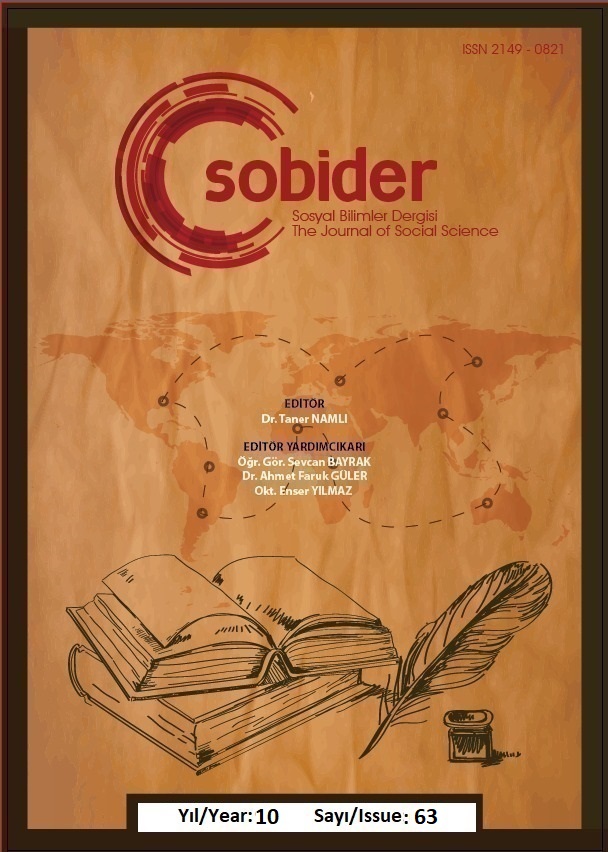COVID-19 SÜRECİNDE MEDYA KULLANIMININ SAĞLIĞA İLİŞKİN KUŞAKLARARASI RİSK ALGISI ÜZERİNE ETKİSİ: MALTEPE ÜNİVERSİTESİ BİLİMSEL ARAŞTIRMA (MÜAR) PROJESİ NİTEL BULGULARI
Author :
Abstract
Bu araştırmanın konusu, COVID-19 salgın sürecinde medya ve network/ağ örgüsü yazılımları kullanımının kuşaklara göre değişmesi ve sağlığa ilişkin farklı risk algıları yaratmasıdır. Söz konusu bu küresel salgında farklı kuşaklarda, farklı risk algılarının oluşması, beraberinde farklı özgürlük, denetim, hastalık ve sağlık anlayışlarının ve açıklayıcı modellerin oluşması ile ilişkilidir. Bu farklılıklar, COVID-19 gibi hassasiyetle yönetilmesi ve yürütülmesi gereken süreçte, hem uygulayıcılar hem de toplum geneli için dezavantajlar meydana getirebilir niteliktedir (Bozkurt, 2020). Toplumun psikolojik bütünlüğü, izolasyon sürecinde salgının riskleri ile başa çıkma yöntemleri, kişisel motivasyon, sağlık ve hastalığa bakış açıları, denetim ve özgürlüğe karşı gelişebilecek direnç, dezavantaja dönebilecek gerçek ve hassas olgulardır (Kalaycıoğlu, 2018). Öte yandan “iletişim biçimlerinin” yalnızca medya ve network yazılımları araçlarının kullanımı ile gerçekleşmek zorunda kaldığı bu salgın döneminde, sağlıklı ve sürdürülebilir bir iletişim modeli geliştirilmediği takdirde, uzun erimli toplumsal kaos ve türevi çıktıların meydana gelmesi kuvvetle muhtemeldir. Bu nedenle, toplumun değerlerini bilerek hem uygulayıcıların yönetim biçimlerine katkı sağlamak hem de kolektif psikolojinin bütünlüğünü sağlamak adına, risk algısının belirlenmesi ve elde edilecek sonuçlara ilişkin temalar geliştirmek önem arz etmiştir. Nitel görüşmelerden elde edilen temalar, gelecekte yaşanacak olası tehditler için bir şablon/paradigma olma özelliği taşıyacaktır.
Keywords
Abstract
The subject of this research is that the use of media and networking software during the COVID-19 pandemic changes according to generations and creates different risk perceptions regarding health. In this global pandemic, the formation of different risk perceptions in different generations is associated with the formation of different understandings of freedom, control, illness and health, and explanatory models. These differences can create disadvantages for both practitioners and society in general, in the process that needs to be managed and carried out sensitively, such as COVID-19 (Bozkurt, 2020). The psychological integrity of the society, methods of coping with the risks of the epidemic during the isolation process, personal motivation, perspectives on health and illness, resistance to control and freedom are real and sensitive facts that can turn into a disadvantage (Kalaycıoğlu, 2018). On the other hand, if a healthy and sustainable communication model is not developed, it is highly likely that long-term social chaos and derivative outcomes will occur in this period, where “communication forms” have to be realized only through the use of media and network software tools. For this reason, it is important to determine the risk perception and develop themes related to the results to be obtained in order to contribute to the management styles of the practitioners and to ensure the integrity of the collective psychology by knowing the values of society. The themes obtained from qualitative interviews will serve as a template/paradigm for possible future threats.
